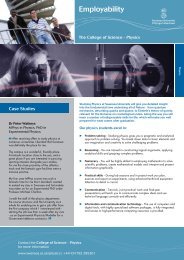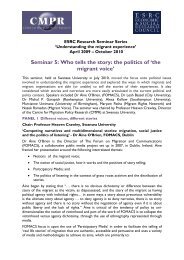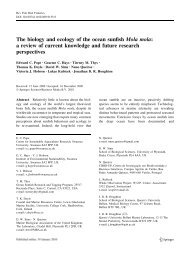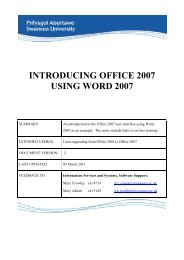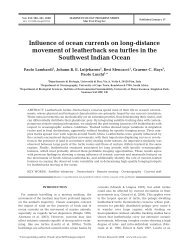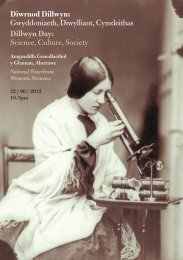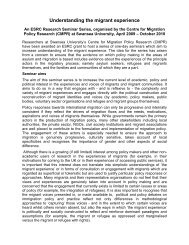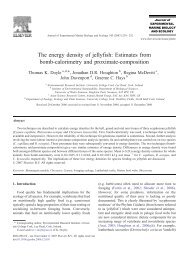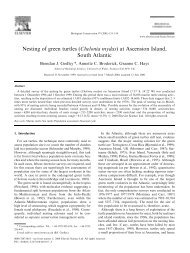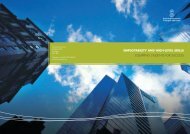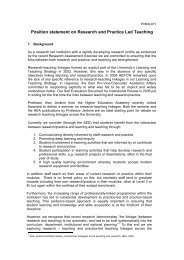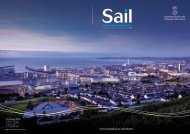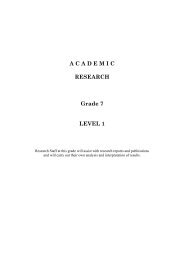Postgraduate Prospectus 2013 - Swansea University
Postgraduate Prospectus 2013 - Swansea University
Postgraduate Prospectus 2013 - Swansea University
Create successful ePaper yourself
Turn your PDF publications into a flip-book with our unique Google optimized e-Paper software.
Geography<br />
Research opportunities<br />
MSc by Research, MPhil, PhD, MRes<br />
RAE2008 60% of research rated<br />
world-leading (4*) or internationally<br />
excellent (3*)<br />
Professors<br />
D Clarke<br />
H Crawley<br />
S Davies<br />
M Doel<br />
S Doerr<br />
T Murray<br />
A Street-Perrott<br />
R Walsh<br />
P North<br />
Geography, the study of the world in<br />
which we live, helps us to understand how<br />
landscapes are shaped, how populations<br />
move and interact, and how climate<br />
change will affect us all. Key research<br />
themes at <strong>Swansea</strong> include environmental<br />
and climatic change, migration and<br />
national identity, glaciology and icesheet<br />
dynamics, global environment modelling<br />
and Earth observation, and social theory<br />
and global cities.<br />
The Department welcomes proposals for<br />
postgraduate research projects that<br />
complement staff research interests.<br />
Research degrees in Geography will:<br />
• provide you with new and specialised<br />
research skills<br />
• prepare you for a career in academic<br />
research and teaching<br />
• equip you with skills relevant for a<br />
rewarding career in a range of fields,<br />
including environmental management,<br />
conservation, planning, local authorities,<br />
education, computing, management,<br />
finance, and insurance<br />
Geographers at <strong>Swansea</strong> benefit from<br />
exceptional computing facilities that<br />
include fifteen dual-processor workstations<br />
for Earth Observation, a 20-node<br />
Academic and research staff 36<br />
<strong>Postgraduate</strong>s 50<br />
Entry requirements:<br />
Normally a Master’s degree or a minimum<br />
of a 2.1 Honours degree. Researchtraining<br />
recognition for Human Geography<br />
applicants is desired.<br />
English Language requirement:<br />
IELTS 6.5 (with a minimum of 5.5 in each<br />
component) or <strong>Swansea</strong> <strong>University</strong><br />
recognised equivalent.<br />
multiprocessor Beowulf cluster, and the<br />
Department’s IBM ‘Blue Ice’<br />
supercomputer, used mainly for climate<br />
and glaciological modelling.<br />
Research Strengths<br />
In Physical Geography, research groups<br />
have a strong quantitative-science<br />
emphasis, encompassing computationally<br />
intensive numerical modelling, advanced<br />
analytical laboratory techniques,<br />
worldwide field campaigns, and satellite<br />
observation. They collaborate with key<br />
agencies such as the British Antarctic<br />
Survey, NASA, and the Hadley Centre.<br />
In Human Geography, research groups<br />
are characterised by socio-spatial<br />
theorisation of the contemporary urban<br />
experience and evidence-based migration<br />
policy research. They work closely with<br />
key institutions such as UNESCO, the<br />
International Organisation for Migration,<br />
and the UK and Welsh Governments.<br />
<strong>Postgraduate</strong> research students will belong<br />
to one or more of these groups, each of<br />
which is supported by a collegiate<br />
research culture and a high-quality<br />
research environment:<br />
Scholarships and Bursaries<br />
A range of postgraduate scholarships and<br />
bursaries is available. For details, please<br />
visit www.swansea.ac.uk/scholarships/<br />
<strong>Postgraduate</strong><br />
<strong>Postgraduate</strong> studentships awarded by the<br />
Natural Environmental Research Council<br />
(NERC), Economic and Social Research<br />
Council (ESRC), Engineering and Physical<br />
Sciences Research Council (EPSRC), and<br />
Arts and Humanities Research Council<br />
(AHRC) and most other funding bodies<br />
can be held in the Department.<br />
Environmental dynamics group<br />
This group reconstructs past climates and<br />
environments using a range of physical<br />
and chemical archives, especially proxy<br />
records derived from ice cores, lake<br />
sediments, and tree rings. It investigates<br />
land-surface processes such as wildfire,<br />
soil-water repellency, and tropical<br />
hydrology, and routinely leads field<br />
expeditions in Africa, America, Asia,<br />
Australia, and Europe, and coordinates<br />
the Royal Society’s field stations in Borneo.<br />
The group benefits from stable isotope<br />
laboratories and specialist facilities for<br />
biogeochemistry, tephrochronology, and<br />
pollen analysis.<br />
Glaciology group<br />
This group studies the dynamics of<br />
fastflowing glaciers and ice streams,<br />
especially the causes of flow instability. It<br />
uses a wide variety of methods including<br />
fieldwork, remote sensing, and modelling,<br />
and facilities include a 3D digital<br />
photogrammetry workstation and<br />
state-of-the-art field equipment. Current<br />
field projects are based in Svalbard,<br />
Antarctica, and the Alps. The group also<br />
houses the GLIMPSE project, which aims<br />
to advance our understanding of the future<br />
of the Greenland ice sheet.<br />
How can I find out more?<br />
Visit our website:<br />
www.swansea.ac.uk/geography<br />
Contact the <strong>Postgraduate</strong><br />
Recruitment Officer:<br />
Tel: +44 (0)1792 295142<br />
Visit the <strong>University</strong>:<br />
see page 174 for details<br />
Global environmental modelling and<br />
Earth observation group<br />
This group uses satellite data to study the<br />
land, atmosphere, and oceans, and to<br />
improve modelling of climatic change.<br />
Research encompasses a wide range of<br />
applications ranging from the local level<br />
to the global scale. The group is involved<br />
in the NERC National Centre for Earth<br />
Observation (NCEO), and works closely<br />
with scientists at NASA, ESA, CEH, and<br />
the Hadley Centre.<br />
Migration, boundaries, and identities<br />
group<br />
This group advances the study of national<br />
and international migration, especially in<br />
relation to ideas of nation, place, and the<br />
social construction of identity (particularly<br />
gender and childhood). It develops new<br />
theoretical frameworks for understanding<br />
the implications of different types of<br />
boundaries – imagined, social, and<br />
political – on the construction and<br />
experiences of particular groups in society<br />
and the ways in which these boundaries<br />
are contested. The group leads the<br />
<strong>University</strong>’s interdisciplinary research<br />
Centre for Migration Policy Research.<br />
Applications can be made online<br />
at: www.swansea.ac.uk/applyonline<br />
– see pages 176 – 177 for further<br />
information<br />
For details of the Master’s courses<br />
available in Geography, please see<br />
page 56.<br />
Social theory and urban space group<br />
This group develops theoretically<br />
sophisticated, empirically bold, and<br />
socially engaged understandings of space<br />
and spatiality, with particular reference to<br />
modern and postmodern cities. It seeks to<br />
transform the conceptual terrain of Human<br />
Geography through a spatialisation of<br />
post-structuralist theory and leads the<br />
<strong>University</strong>’s interdisciplinary research<br />
Centre for Urban Theory.<br />
One year MSc by Research programmes<br />
are also available in the following<br />
specialist areas:<br />
• Earth observation<br />
• Environmental dynamics<br />
• Glaciology<br />
• Global environmental modelling<br />
• Global migration<br />
• Media geographies<br />
• Social theory and space<br />
• Urban studies<br />
“As part of researching for a<br />
PhD in glaciology at <strong>Swansea</strong>, I<br />
was fortunate enough to spend<br />
two months in the Svalbard. This<br />
has been the highlight of my<br />
postgraduate study as the<br />
experience of learning field<br />
techniques in the Arctic,<br />
witnessing the Northern Lights<br />
and racing across the sea-ice<br />
on a snow-scooter is something<br />
I will always appreciate.<br />
”<br />
Damien Mansell,<br />
PhD Glaciology<br />
Research Degrees – Geography<br />
116<br />
117



